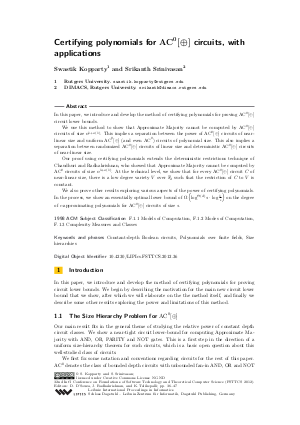Certifying polynomials for AC^0(parity) circuits, with applications
Authors Swastik Kopparty, Srikanth Srinivasan
-
Part of:
Volume:
IARCS Annual Conference on Foundations of Software Technology and Theoretical Computer Science (FSTTCS 2012)
Part of: Series: Leibniz International Proceedings in Informatics (LIPIcs)
Part of: Conference: IARCS Annual Conference on Foundations of Software Technology and Theoretical Computer Science (FSTTCS) - License:
 Creative Commons Attribution-NonCommercial-NoDerivs 3.0 Unported license
Creative Commons Attribution-NonCommercial-NoDerivs 3.0 Unported license
- Publication Date: 2012-12-14
File

PDF
LIPIcs.FSTTCS.2012.36.pdf
- Filesize: 455 kB
- 12 pages
Document Identifiers
Subject Classification
Keywords
- Constant-depth Boolean circuits
- Polynomials over finite fields
- Size hierarchies
Metrics
- Access Statistics
-
Total Accesses (updated on a weekly basis)
0Document
0Metadata
Abstract
In this paper, we introduce and develop the method of certifying polynomials for proving AC^0 circuit lower bounds.
We use this method to show that Approximate Majority cannot be computed by AC^0(parity) circuits of size n^{1 + o(1)}. This implies a separation between the power of AC^0(parity) circuits of
near-linear size and uniform AC^0(parity) (and even AC^0) circuits of polynomial size.
This also implies a separation between randomized AC^0(parity) circuits of linear size and deterministic AC^0(parity) circuits of near-linear size.
Our proof using certifying polynomials extends the deterministic restrictions technique of Chaudhuri and Radhakrishnan, who showed that Approximate Majority cannot be computed by AC^0 circuits of size n^{1+o(1)}.
At the technical level, we show that for every ACP circuit C of near-linear size, there is a low degree variety V over F_2 such that the restriction of C to V is constant.
We also prove other results exploring various aspects of the power of certifying polynomials. In the process, we show an essentially optimal lower bound of Omega\left(\log^{\Theta(d)} s \cdot \log \frac{1}{\epsilon} \right) on the degree of \epsilon-approximating polynomials for AC^0(parity) circuits of size s.
Cite As Get BibTex
Swastik Kopparty and Srikanth Srinivasan. Certifying polynomials for AC^0(parity) circuits, with applications. In IARCS Annual Conference on Foundations of Software Technology and Theoretical Computer Science (FSTTCS 2012). Leibniz International Proceedings in Informatics (LIPIcs), Volume 18, pp. 36-47, Schloss Dagstuhl – Leibniz-Zentrum für Informatik (2012)
https://doi.org/10.4230/LIPIcs.FSTTCS.2012.36
BibTex
@InProceedings{kopparty_et_al:LIPIcs.FSTTCS.2012.36,
author = {Kopparty, Swastik and Srinivasan, Srikanth},
title = {{Certifying polynomials for AC^0(parity) circuits, with applications}},
booktitle = {IARCS Annual Conference on Foundations of Software Technology and Theoretical Computer Science (FSTTCS 2012)},
pages = {36--47},
series = {Leibniz International Proceedings in Informatics (LIPIcs)},
ISBN = {978-3-939897-47-7},
ISSN = {1868-8969},
year = {2012},
volume = {18},
editor = {D'Souza, Deepak and Radhakrishnan, Jaikumar and Telikepalli, Kavitha},
publisher = {Schloss Dagstuhl -- Leibniz-Zentrum f{\"u}r Informatik},
address = {Dagstuhl, Germany},
URL = {https://drops.dagstuhl.de/entities/document/10.4230/LIPIcs.FSTTCS.2012.36},
URN = {urn:nbn:de:0030-drops-38467},
doi = {10.4230/LIPIcs.FSTTCS.2012.36},
annote = {Keywords: Constant-depth Boolean circuits, Polynomials over finite fields, Size hierarchies}
}
